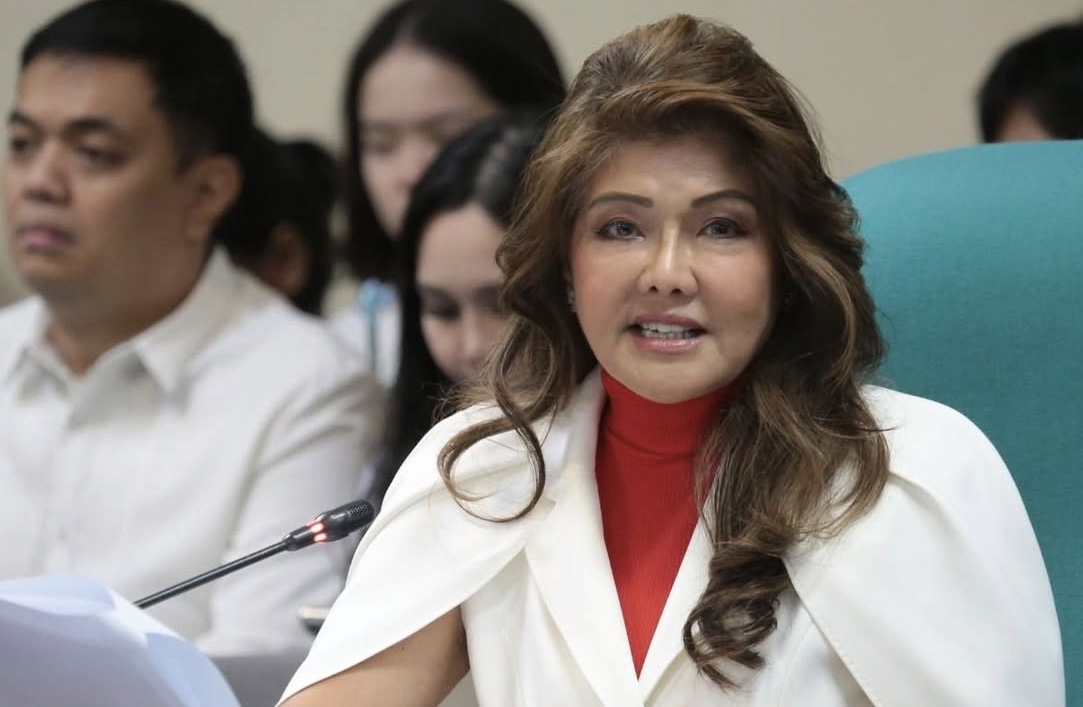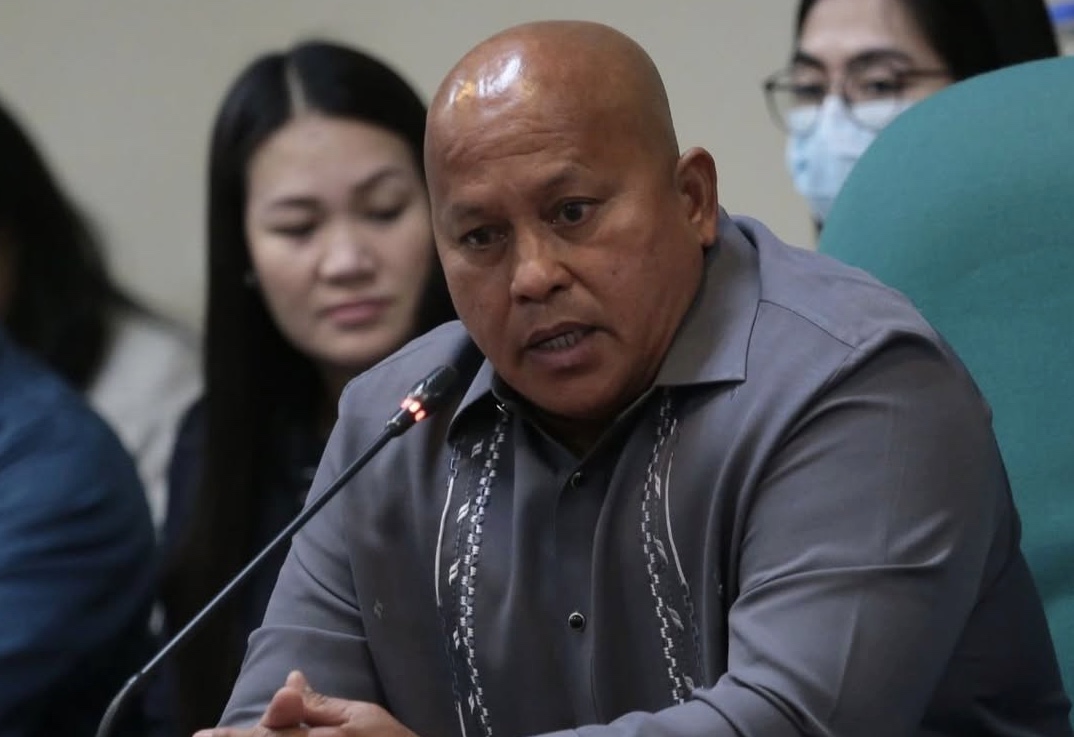Cabinet officials no-show in second Senate hearing on Duterte's ICC arrest
"Insufficient." That's how Sen. Imee Marcos called the explanation of Executive Secretary Lucas Bersamin for Cabinet officials to skip the second Senate committee hearing into the arrest of ex-president Rodrigo Duterte and turnover to the International Criminal Court.
"Marami pang tanong na nangangailangan ng sagot," Marcos said during the Senate Committee on Foreign Relations hearing on Thursday, April 3. "Napakarami nating mamamayan na nagpadala ng iba't ibang dokumento, impormasyon, at ebidensiya. Pagkakataon sana ang hearing na ito na magpaliwanag ang Cabinet members sa taumbayan."
Marcos noted Bersamin's formal notice of refusal on March 31, in which he cited executive privilege and possible violation of the sub judice rule as reasons for skipping the hearing.
She reiterated her response to Bersamin on April 1, where she asked him to reconsider.
"It is claimed that further participation by executive officials may no longer be necessary because they have ‘candidly provided all information’ elicited by the Committee during the last hearing (on March 20) and that the undersigned has already publicly relayed her ‘comprehensive findings thereon,'" Marcos said. "Finally, you invoked the sub judice rule because there are four petitions currently pending in the Supreme Court involving the arrest and surrender of Former President Rodrigo Roa Duterte."
Marcos said the “findings” referred to by Bersamin, “while sufficiently backed by factual and legal bases, are nonetheless preliminary.” She noted that the officials must “clarify issues and questions" from the last hearing "in the interest of fairness and transparency.”
As for Bersamin's sub judice reasoning, Marcos noted a past SC decision which stated that ongoing judicial proceedings don't preclude congressional hearings in aid of legislation.
"The power of legislative inquiry is an essential component of legislative power," she said. "The same cannot be made subordinate to a criminal or an administrative investigation or to special civil actions pending before the Supreme Court."

Marcos said such reasoning shouldn't be made a "blanket shield" to supposedly evade inquiry.
"Ang katotohanang tinatago ay kasinungalingan din," she said. "Mukhang ganoon ang nangyayari ngayon... gamit ang executive privilege at sub judice... nagmimistula tuloy na may cover-up sa mga nangyayari."
Marcos then called attention to the empty seats and the name plates of the supposed attendees.
At a media event on the same day, Bersamin reiterated their reasons anew for not attending.
"We determine that there are many probable or likely topics covered by those matters that would come under executive privilege," he said. "It would be best to get ahead with a letter to [Sen. Marcos] and the Senate President to be formally informed."
Palace Press Officer Claire Castro, meanwhile, previously said that President Ferdinand "Bongbong" Marcos Jr.—the brother of Imee—won't interfere in the Senate hearing.
Dela Rosa's appearance
The April 3 hearing also saw the first appearance of Sen. Ronald "Bato" Dela Rosa in the Senate hearing on Duterte's arrest. He was a no-show in the March 20 hearing.
Dela Rosa asked Marcos to subpoena Bersamin and other absent officials in the next hearing.
“Ito’y tahasang pagbalewala sa doktrina ng checks and balances ng ating gobyerno," he said. "Kung ayaw nila mag-attend ng hearing, ayaw nilang magpacheck sa atin... I think we are now on the verge of constitutional crisis kapag tuluyan nilang isnub ang ating imbestigasyon, walang mangyayari."

Marcos, then, said she had requested Senate President Chiz Escudero to subpoena two officials who were absent in the first hearing: Air Force Chief Arthur Cordura and Prosecutor General Richard Fadullon.
Dela Rosa asked to do a follow-up, noting that if such a situation is "left unchecked," there would be supposed violations of Philippine laws.
"Kaya nag-eexist ang Senado, ang Kongreso in particular, para mayroon tayong checks and balances. Hindi pwedeng ang executive branch, hahayaan na lang natin," he said.
'Lack of due process' anew
Go, who attended the Senate hearing via Zoom, rehashed past arguments about the supposed lack of due process in Duterte's ICC arrest and the supposed violation of the former president's rights.
"The Philippine government was under no legal obligation to arrest the former president and surrender him to an international court," he said, adding that the diffusion notice from the International Criminal Police Organization, on behalf of the ICC, was "unverified."
Anthony Alcantara, executive director of the Philippine Center on Transnational Crime, which supervises Interpol-National Center Bureau-Manila, said the ICC's diffusion notice was classified as "red" and tantamount to Interpol's red notice, which aims to “seek the location and arrest of persons wanted for prosecution or to serve a sentence.”
On its website, Interpol says a “wanted persons red diffusion" is a notice "circulated to arrest, detain, or restrict the movement of a convicted or accused person—is checked for compliance by the Notices and Diffusions Task Force."
In the diffusion notice shown by Imee, Duterte was tagged as a "wanted" person for crimes against humanity.
Go also floated anew the ICC's lack of jurisdiction over the Philippines.
"Hanggang ngayon, 'yan pa rin ang pinag-uusapan," he said. "Bakit pinayagan pa rin... bakit binigyan-pansin?"
Duterte withdrew the country's membership from the ICC in 2018, which took effect the following year.
Despite the withdrawal, the ICC said it still has jurisdiction over crimes that happened while the Philippines was still a member-state.
The international tribunal said it's acting based on the principle of complementarity, which means that it's only stepping in if a state's courts are unwilling or unable to prosecute crimes within their jurisdiction.
In the March 20 hearing, Department of Justice Sec. Crispin "Boying" Remulla cited the Republic Act No. 9851, or the Philippine Act on Crimes Against International Humanitarian Law, Genocide, and Other Crimes Against Humanity, as the basis for the government's move to surrender Duterte to authorities.
Section 17 states that, in the interest of justice, the "relevant Philippine authorities may dispense with the investigation or prosecution of a crime punishable under this Act if another court or international tribunal is already conducting the investigation or undertaking the prosecution of such crime."
While acknowledging that the Philippines isn't a member-state of the ICC anymore, Remulla noted that the ICC still runs after individuals for alleged crimes. According to Remulla, over 150 countries worldwide have adopted the international humanitarian law as a "customary law." Moreover, Remulla pointed out that Duterte's arrest warrant was issued by Interpol, which the Philippines has a long-standing commitment to as its member since 1952.
President Marcos also reiterated the country's commitments to Interpol following Duterte's arrest. "If we don't do that, they will no longer help us with other cases involving Filipino fugitives abroad," he said. "This is what the international community expects of us as the leader of a democratic country that is part of the community of nations."
Duterte's arrest
Duterte was arrested at the Ninoy Aquino International Airport on March 11 following a warrant of arrest issued by the ICC via the International Criminal Police Organization.
He has been accused of being an "indirect co-perpetrator for the crime against humanity of murder pursuant to Article 7 (1)(a) of the Roman Statute."
Specifically, he was allegedly involved in the murder of at least 19 persons reported to be drug pushers or thieves who were killed by members of the Davao Death Squad in various locations in or around Davao City between 2011 and 2016, as well as the murder of at least 24 alleged criminals who were killed by or under the supervision of members of the Philippines law enforcement at various locations in the country between 2016 and 2019 during his term as president.
Duterte arrived in The Hague in the Netherlands on March 12 to face the charges against him.
He made an initial appearance before the ICC on March 14, during which the Pre-Trial Chamber I verified his identity and the language in which he would be able to follow the proceedings.
The chamber also informed him of the charges he's facing and of his rights under the ICC Rome Statute.
Duterte's pre-trial hearing is on Sept. 23, 2025, or six months after his initial appearance.
He could be the first Asian former head of state to be indicted by the ICC.
If the charges against him are confirmed, it could be months before the case eventually goes on trial, and years before a final judgment is rendered.


